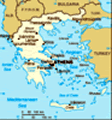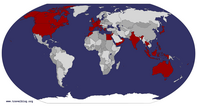Advertisement
Published: June 12th 2017
We walk around the harbour and collect our tickets for our trip to Delos. We're given yellow stickers to put on our shirts, so that the tour guides on Delos will know which group we're in. Issy loses hers before the boat's left the port, and I'm now regretting sending the nasty email to the tour company. I hope they don't try to throw her overboard. I put my arm around her to cover the spot where the sticker should be, but I'm now in real danger of getting get arrested for indecency. Although it's still very windy the boat is big and slow enough so that we don't get tossed around too much.
We meet our guide who introduces herself as Effie. We probably could have guessed that. The first thing she tells us is that it's windy. I'm pretty sure we knew that already. She says that it's not however too windy by Mykonos standards. She tells us that the alternative name for Mykonos is the Island of the Wind and that on average there are only ten windless days here per year. I'm pleased to hear that it really is windy, and that I haven't developed a
sudden intolerance to strong breezes. I wonder what she means by a windless day. I think this still might be a hurricane by anything other than local standards.
Effie tells us that Delos was first inhabited in the third millennium BC, so about five thousand years ago. The Ionians then came here from Athens in about 900 BC and somehow decided that it was the birthplace of the twin gods Apollo and Artemis, who were the illegitimate children of Zeus and Leto. Zeus' wife Hera wasn't overly happy about Zeus' infidelity, so she wouldn't allow Leto to give birth on land. It was apparently alright however for her to give birth on Delos, because this was floating around in the sea. Apollo was a very significant god, and was amongst other things the god of music, truth, prophecy, healing, the sun and light, plague and music. I wonder what the god of plague's role was. Whatever it was I suspect he might have been a good god to stay on the right side of. Because Delos was such a significant religious site, the Greek rulers decided that it needed purifying, so they dug up any graves on the island,
and made a decree that no one was allowed to be born or to die here. Apparently if you needed to give birth, you had to go to the nearby island of Reinia. I wonder what they did to you if you inadvertently died here.
Effie tells us that the Greeks were a bit elitist. They invented the word barbarian to refer to anyone who didn't speak Greek, as they thought everything they said sounded like like "bar, bar, bar". So it seems that Issy and I are barbarians. This is good to know.
The Romans came to Delos in the second century BC, and turned it into a tax free port. The population then skyrocketed to as much as 30,000, with its residents coming from other parts of Europe, Africa and Asia Minor. There was even a synagogue here. Religious and racial tolerance was seen to be a real virtue so everyone lived in harmony. Delos is about the tenth the size of Mykonos, and 30,000 people is roughly double the number of people on Mykonos at the peak of the tourist season. Mykonos feels a bit crowded now, so Delos must have felt like a sardine
can. Apparently some of the houses had basements and three upper storeys so they could fit everyone in. It became a major trade centre for goods and slaves, and was home to many of the known world's wealthiest inhabitants.
Life on Delos changed suddenly and dramatically in 88 BC, when it was attacked by Mithridates VI of Pontus - an arch enemy of Rome from northern Turkey. It was an easy target. Because everyone here lived in harmony, they hadn't bothered to build any defences. Mithridates slaughtered 20,000 of the inhabitants, and took the rest as slaves. He destroyed a lot of the buildings, and looted most of the marble and bronze. The island then became virtually uninhabited, and only drew interest as an archaeological site in the late nineteenth century.
Effie tells us that Delos is the largest archaeological site in the Aegean Sea and one of the largest in the Mediterranean. The island is more or less completely barren and there's only one tree here - a date palm, which is kept alive artificially because it has historical significance. She assures us that it's not the original 2,000 year old palm tree. The whole of Delos
is a UNESCO world heritage site. The only people who are allowed to live on the island are archaeologists, guards and workers, and swimming in the sea around the island is prohibited in order to protect its underwater ruins.
The site is massive and does indeed look like it could once have been a city of 30,000 people. Whilst most of the marble and bronze has gone, a lot of the stone walls are still standing as they were a couple of thousand years ago. Effie points out the arrow symbols that are on a lot of the walls. She tells us that these are not arrows, but phallic symbols. She says that the people here were very superstitious, and the phallic symbol was supposed to bring good luck. She says that she's sure that we would have seen a lot of phallic symbols for sale in Mykonos, and this doesn't mean that the Greeks of today are kinky, they just like selling replicas of ancient good luck symbols. At least this explains the bottle openers we've seen on sale. Well partly explains them. I'm not sure that they had bottles in Ancient Greece, so I think the modern
day Greeks are still at least just a little bit kinky and the ancient good luck symbols thing is just a convenient excuse for them to make phallic shaped objects. We go into the remains of the most intact house on Delos, which still has most of its walls, some of its marble columns, and an intact mosaic floor. We move on to the outdoor theatre. There hasn't been a performance here for two thousand years, but this is about to change. The first two rows of seats are being restored sufficiently to put on a Greek tragedy for a couple of hundred people in a few days time, so we're not allowed in. This is another good example of Murphy's law in action. We could have seen the theatre close up on any day for the past two thousand years, except today. We walk along the town's main street and out the main gate to a row of lion statues. These are apparently very famous, and guard the low lying area with the palm tree and about the only green looking shrubs we've seen since we got here. The lions seem to have eroded a bit over the millennia
and Issy says they now look more like seals. The low lying area was originally a small lake to assist with the significant issue of trying to supply water to 30,000 people living on a barren rocky island. The lake was drained when the archaeologists moved in as a lot of them were getting malaria. Effie's tour ends outside the museum, and she recommends we have a look at its impressive array of marble statues and other artefacts. She tells us that other Delos artefacts are on display in museums in Mykonos and Athens, and in the British Museum in London. The museum display here is certainly very impressive.
Effie told us before the tour ended that we would have just enough time to climb up to the island's peak, Mount Kynthos, before the boat leaves. We've now used up some of this looking at the museum. She said that we should be sure to get back to the boat on time, because it's the last one for the day, and if we miss it, the only way to get back to Mykonos is to swim. Issy says she'll meet me on the boat. The climb is along a
steep path with rocks jammed together to form rudimentary steps. I realise that I'll need to run if I'm to get to the top and back again quickly. I'm again wearing thongs, and finding it a bit of a struggle to run up the steep steps without tripping over. The view from the top is spectacular, but I only stay for a minute, because I'm now in real danger of missing my ride. I wonder what they'll do to me if I get trapped here overnight. Maybe I can pretend that I'm an archaeologist. I have a camera. I'm sure that lots of archaeologists have cameras.
Back on Mykonos we manage to score a dinner table right next to the water. Our Canadian waiter tells us that the restaurant is only open for six months of the year and all the staff then move back to Athens and twiddle their thumbs for the other six months. He says that Mykonos is a ghost town during the winter and most people who work on the island are only here for the tourist season. We're tired, but this doesn't prevent us from discussing some very serious topics. In Spain we heard
about Joanna the Mad and Philip the Handsome. Joanna's parents probably didn't know that she'd be mad when she was born, so we conclude that they probably didn't give her this name. We wonder when she got her new name. Did she suddenly become Joanna the Mad the first time she did something a bit silly? Did she then have to go somewhere to get her name changed? Did she record her middle name as "The" on her census form?
Advertisement
Tot: 0.045s; Tpl: 0.014s; cc: 8; qc: 19; dbt: 0.0221s; 1; m:domysql w:travelblog (10.17.0.13); sld: 1;
; mem: 1.1mb

















